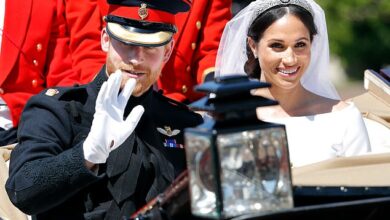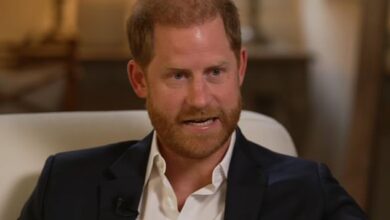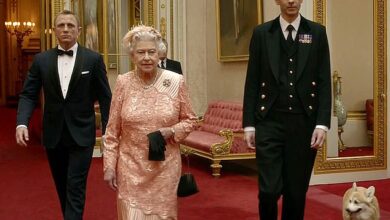‘I would like that person’s name’: Prince Harry demanded to know who was responsible for downgrading his police protection, court documents reveal after he loses his legal battle over the decision
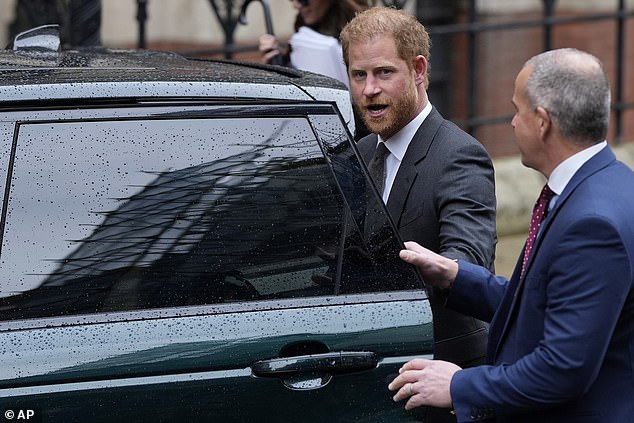
Prince Harry demanded to know who was responsible for downgrading his Home Office police protection and even asked for their name, court documents have revealed.
The Duke of Sussex potentially faces a large bill to reimburse taxpayers’ legal costs after a judge said he had failed to prove the downgrade was unlawful or unfair.
Harry, 39, took the Home Office to court over no longer being given the ‘same degree’ of protection after he and wife Meghan quit royal life and left Britain in January 2020.
He compared the dangers to him and his family to the risks his mother Princess Diana faced before her death in 1997 while being chased by paparazzi.
It emerged in the 52-page ruling yesterday that he had demanded to know who in government was responsible for the decision, saying: ‘I would like that person’s name.’

Prince Harry (pictured last March outside the High Court) vowed to appeal after losing a High Court battle with the Home Office over downgrading his police protection
He complained his visits to Britain were unsafe – and Judge Sir Peter Lane said that when he and Meghan used a train to visit Manchester in September 2022, he ‘raised concerns because of his proximity to the public’.
Harry’s American private security specialist told the High Court that Harry had felt cornered during a visit to the Wellchild Awards in Kew, West London in June 2021 when ‘paparazzi made them feel like sitting ducks’.
He argued he had been ‘singled out’ and treated unfairly when his automatic police protection was withdrawn following the ‘Sandringham Summit’ with the late Queen in January 2020 just before leaving the UK.
After feeling unsafe when he came to Britain in the summer of 2021 to unveil a statue of his late mother with his brother William, Harry took court action.
He brought a judicial review against the decision by the executive committee for the Protection of Royalty and Public Figures (Ravec), which falls under the Home Office.
At a hearing in London last December, the Government insisted Harry’s claim should be dismissed, arguing Ravec was entitled to conclude the Duke’s protection should be ‘bespoke’ and considered on a ‘case-by-case’ basis.
Lawyers for the Home Office said Britain had ‘finite public resources’ and that it was appropriate for police protection to be limited to those ‘acting in the interests of the state through their public role’. Sir Peter’s ruling concluded ‘there has not been any unlawfulness’ in Ravec’s decision nor was it ‘irrational’ or ‘marred by procedural unfairness’.
Harry had argued that, just because he was no longer a frontline royal, that did not diminish the threats he faced by virtue of being in the line of succession to the throne and ‘a Prince of the realm’.
But the judge said Ravec ‘was well aware of the claimant’s status, background and profile’ when it made its decision.
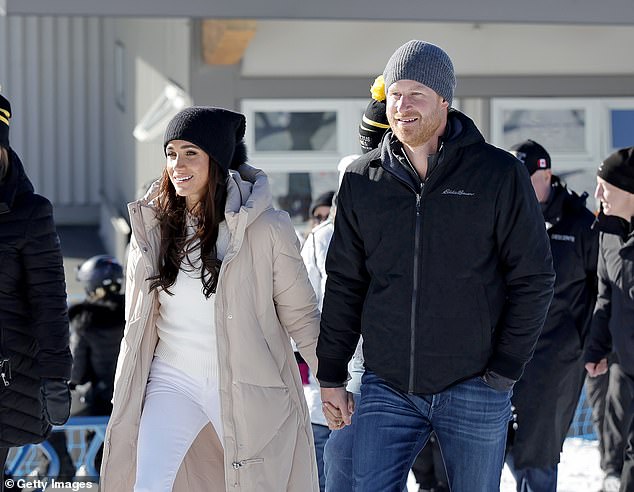
Prince Harry and Meghan, pictured at an Invictus Games event in Canada on February 14, 2024
Sir Peter praised the Ravec committee, and its then chairman Sir Richard Mottram, for their ‘significant knowledge and expertise’ in a highly specialist area.
Harry insisted that Ravec should have considered the ‘impact that a successful attack’ on him would have.
But the judge said it would be ‘bizarre’ if the highly experienced chairman of Ravec ‘would not have had in mind the consequences of a successful attack’ and yet Ravec had still not shared Harry’s concern.
Within hours of the judgment, a spokesman for Harry announced he would appeal it, adding that he was ‘not asking for preferential treatment but for a fair and lawful application of Ravec’s own rules’.
It is the latest court blow to Harry after he admitted defeat last month in a libel case against The Mail on Sunday over articles it had published about his battle with the Home Office.
The Duke was left facing a £750,000 legal bill after abandoning his case just six hours before a deadline for handing over a list of documents.
This latest High Court challenge against the Home Office could land him with an estimated £1million bill on top of that.
The father-of-two could now have to pay the costs for his own lawyers, as well as the legal costs of the Home Office, a total that could reach seven figures, The Times reports.
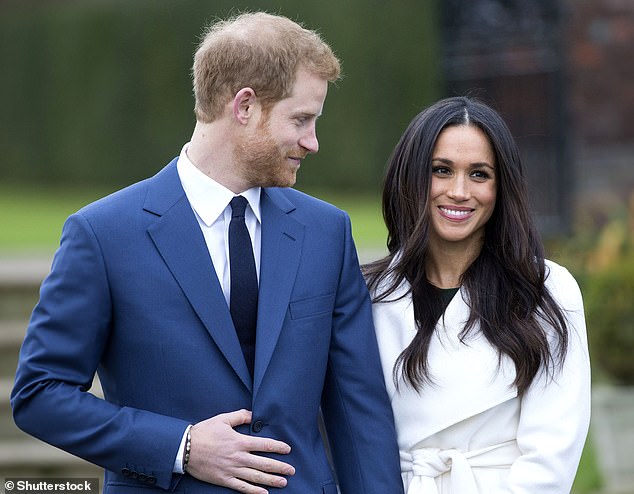
Prince Harry and Meghan Markle stand outside Kensington Palace after announcing their engagement in November 2017

The Duke and Duchess of Sussex attend an event in Whistler near Vancouver in the build up to the 2025 Invictus Games
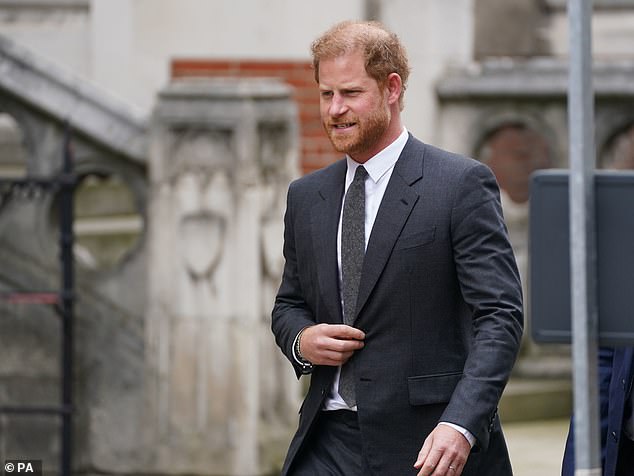
The Duke of Sussex, pictured leaving the Royal Courts of Justice in London on March 30, 2023
The Home Office revealed in October last year that it had already incurred legal costs of £407,000 as a result of the case, and that was before the three-day trial itself took place in December.
Meanwhile, the California-based royal hired law firm Schillings International and four barristers to help him bring the court action, potentially bringing his own personal costs even higher.
Losing parties in High Court cases normally have to pay the legal costs for both sides, with the Duke now hoping for a successful appeal against the ruling.
A spokesman for Harry said he would appeal the decision, adding that he was ‘not asking for preferential treatment, but for a fair and lawful application of Ravec’s own rules’.
They said: ‘The Duke of Sussex will appeal today’s judgment which refuses his judicial review claim against the decision-making body Ravec, which includes the Home Office, the royal household and the Met Police.
‘Although these are not labels used by Ravec, three categories – as revealed during the litigation – comprise the ‘Ravec cohort’: the role based category, the occasional category and the other VIP category.
‘The Duke is not asking for preferential treatment but for a fair and lawful application of Ravec’s own rules, ensuring that he receives the same consideration as others in accordance with Ravec’s own written policy.
‘In February 2020, Ravec failed to apply its written policy to the Duke of Sussex and excluded him from a particular risk analysis. The duke’s case is that the so-called ‘bespoke process’ that applies to him is no substitute for that risk analysis.
‘The Duke of Sussex hopes he will obtain justice from the Court of Appeal, and makes no further comment while the case is ongoing.’
The Duke will first need a judge to give him the green light to go to the Court of Appeal.
A judgment summary in Harry’s case released this morning said the court determined ‘there has not been any unlawfulness in reaching the decision’, adding that it was not ‘irrational’.
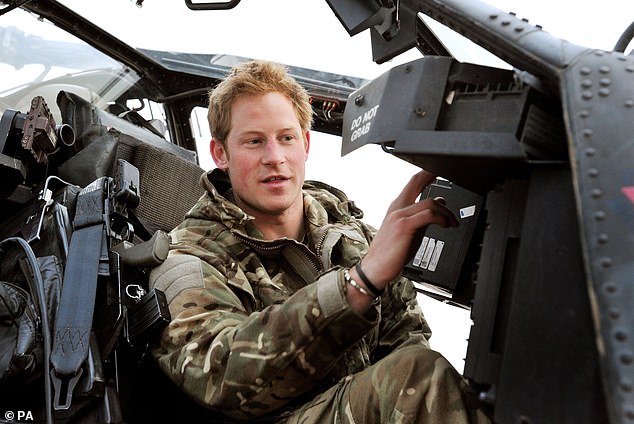
Prince Harry making pre-flight checks in the cockpit at Camp Bastion in Afghanistan in 2012
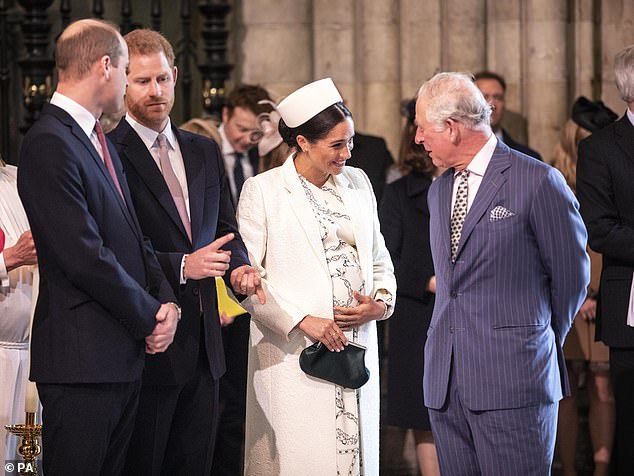
William, Harry, Meghan and Charles speak together at a service at Westminster Abbey in March 2019 – the year before the Sussexes stepped down as senior royals and moved to the US
The court also found the ‘decision was not marred by procedural unfairness’ and there was no unlawfulness by Ravec in its arrangements for his visits to Britain.
In his 52-page partially redacted ruling, Sir Peter said Harry’s lawyers had taken ‘an inappropriate, formalist interpretation of the Ravec process’.
He added: ‘The ‘bespoke’ process devised for the claimant in the decision of February 28, 2020 was, and is, legally sound.’
The judge also said: ‘The decision of February 28, 2020 was obviously forward-looking in nature.
‘The suggestion that the claimant should have received both an RMB (risk) analysis and a ‘bespoke’ approach ignores the witness evidence of the defendant which, for the reasons I have given, falls to be given weight.
‘That evidence shows no irrationality or other unlawfulness, as regards the other VIP category.’
Sir Peter also noted it was ‘highly relevant’ that on January 11, 2020, Sir Edward Young, then Queen Elizabeth II’s private secretary, gave Harry a ‘draft options paper’ outlining that the ‘level of protection is a decision for the Home Secretary, delegated to the chair’ of Ravec.
The paper set out how the process worked – and Harry’s own private secretary Fiona Mcilwham then met with Cabinet Secretary Sir Mark Sedwill, saying in an email that she ‘faithfully relayed the details you provided on security… to the Duke’, according to the court papers.
The judge said there was ‘no substance in the contention that the defendant failed to act in a procedurally fair manner’.
He added: ‘In particular, there was no reason to assume that the claimant’s private secretary was unaware of the security issues arising as a result of the claimant’s [redacted text].’
The judge also said that ‘On the contrary, the evidence shows that she was entirely conversant with them’ following a meeting on January 27, 2020 with Sir Edward, Ravec chair Sir Richard Mottram and Prince William’s private sectary Simon Case.
Sir Peter added: ‘If there had been the need for any questions to be asked about ‘Ravec, Ms Mcilwham can be expected to have asked them.
‘I do not accept that the fact she may have been private secretary for some six months has any bearing. Her communications are indicative of someone with a good grasp of her job.’
The judge said he accepted comments from Sir Richard, who said that, even if he had received a document setting out all of Harry’s legal arguments in February 2020, ‘I would have reached the same decision for materially the same reasons’.
In addition, Sir Peter criticised Harry’s claim of the ‘alleged irrationality’ of him having to give 28 days’ notice of travelling to Britain.
The judge said: ‘There is no merit in this contention. It arose from the need to be able to address a [redacted] of the kind belatedly given by the claimant to Ravec in relation to the June/July 2021 visit.
‘Given Ravec’s expertise, the decision to require 28 days’ notice would need to be shown, by reference to evidence, to have been plucked out of the air or imposed for some extraneous reason, before this head of challenge could be made out. The claimant has pointed to nothing of the kind.’
Responding to the ruling, a Home Office spokesman said on Wednesday: ‘We are pleased that the court has found in favour of the Government’s position in this case, and we are carefully considering our next steps. It would be inappropriate to comment further.
‘The UK Government’s protective security system is rigorous and proportionate.
‘It is our long-standing policy not to provide detailed information on those arrangements, as doing so could compromise their integrity and affect individuals’ security.’
Sir Peter – who officially retired as a High Court judge on February 1 – said his ruling contained redactions because if such information was made public it would have ‘a serious adverse impact on the individuals concerned, as well as being contrary to the public interest, including that of national security’.
MailOnline has contacted the Sussexes for comment.


